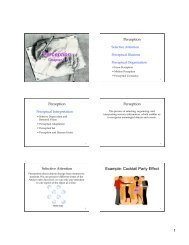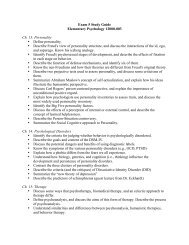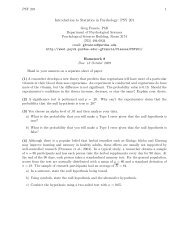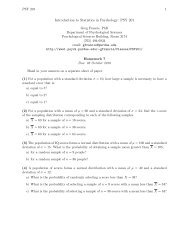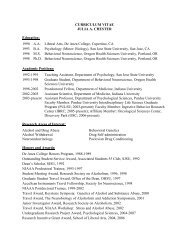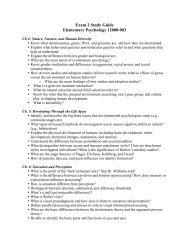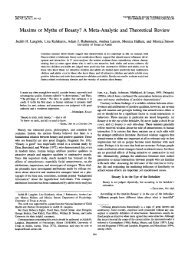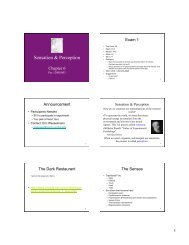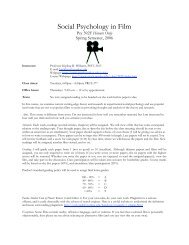Introduction to Cognitive Psychology - Department of Psychological ...
Introduction to Cognitive Psychology - Department of Psychological ...
Introduction to Cognitive Psychology - Department of Psychological ...
Create successful ePaper yourself
Turn your PDF publications into a flip-book with our unique Google optimized e-Paper software.
Greg Francis 1/2/13However,...Searle has set up a deceptively simple scenario the Chinese room may be an impossibilityYou can imagine a situation where one has a bookwith rules <strong>to</strong> answer questions in Chinese but only if you do not think <strong>to</strong>o hard in reality, there may be no such book! if the questions can be on almost any <strong>to</strong>pic, thenunderstanding is required for that type <strong>of</strong> complexprocessingAnd understanding is generally restricted <strong>to</strong>consciousness Or maybe one needs <strong>to</strong> conclude that such an advancedbook has potential consciousnessPurdue UniversityAnd moreover...At a smaller level <strong>of</strong> computation, it is hard <strong>to</strong> seehow consciousness could not be (theoretically)possible in computersEach cell in your head is data in - data out suppose cells were gradually replaced by tinycomputers that kept all processing the same» Neuromorphic chips would you claim that at some point you are no longerconscious?There is nothing fundamental about organicconsciousnessPurdue University2. QualiaSome researchers object <strong>to</strong> the very idea thatcomputers could become conscious They argue that some things in consciousness are notjust computation e.g., consider the color red There seems <strong>to</strong> be a particularly subjective experience<strong>of</strong> seeing something red2. QualiaConsider two people who see the world incolor oppositesQualia for person 1A red apple with agreen leafQualia for person 2A red apple with agreen leafPurdue UniversityPurdue University2. QualiaClearly, theres a big difference in theperceptual experience <strong>of</strong> these people,but their behavior is essentially the same And there seems no way <strong>to</strong> distinguish oneexperience from the other Its the unmeasureable experience that is aqualia2. QualiaQualia proponents argue, for example, you can learn all there is <strong>to</strong> know about light waves,pho<strong>to</strong>recep<strong>to</strong>rs, neural transduction and coding <strong>of</strong>color,… But suppose you never see any red objects Your knowledge will not tell you what you willexperience when you first see the red <strong>of</strong> an apple Indeed, you could be tricked in<strong>to</strong> believing a greenapple was red (if you had never seen green either)Purdue UniversityPurdue UniversityPSY200 <strong>Cognitive</strong> <strong>Psychology</strong> 4



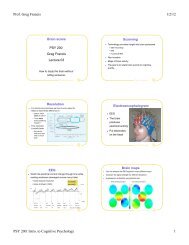

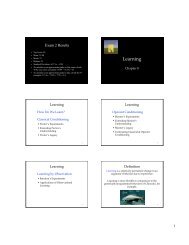
![Exam 4 Study Guide[1]](https://img.yumpu.com/45196739/1/190x245/exam-4-study-guide1.jpg?quality=85)
